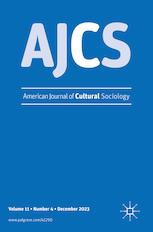
Jules Zhao Liu and Prynne Yan Liu
American Journal of Cultural Sociology, 2023
Abstract: This article addresses a collective protest triggered by the Hong Kong Palace Museum in 2016–2017. Conventional approaches to social movement studies, such as Marxism, rational choice theory, and social psychological paradigms, focus on political opportunity structure, rational choice, and framing and collective identity. This research adopts a new cultural sociological approach, namely cultural pragmatics and iconicity, to scrutinize how an iconic performance of the protest reconstructed the meaning of the museum, turned it into an icon of the Chinese Communist Party’s (CCP) authoritarian power, and channeled some Hong Kong people’s anti-China sentiment to the museum. Since performativity of the icon and iconicity in the performance played equal roles in this transformative process, we coin a term iconic performance to stress the dual processes and integrate the merits of these two theories. Although cultural pragmatics and iconicity have been used to study diversified phenomena, they have not drawn serious attention from social movement scholars. This research attempts to enrich scholars’ understanding of these theories through a Hong Kong case.
About the author: Jules Zhao Liu was a HYI Chinese Politics Training Program Visiting Fellow from 2016-17.
